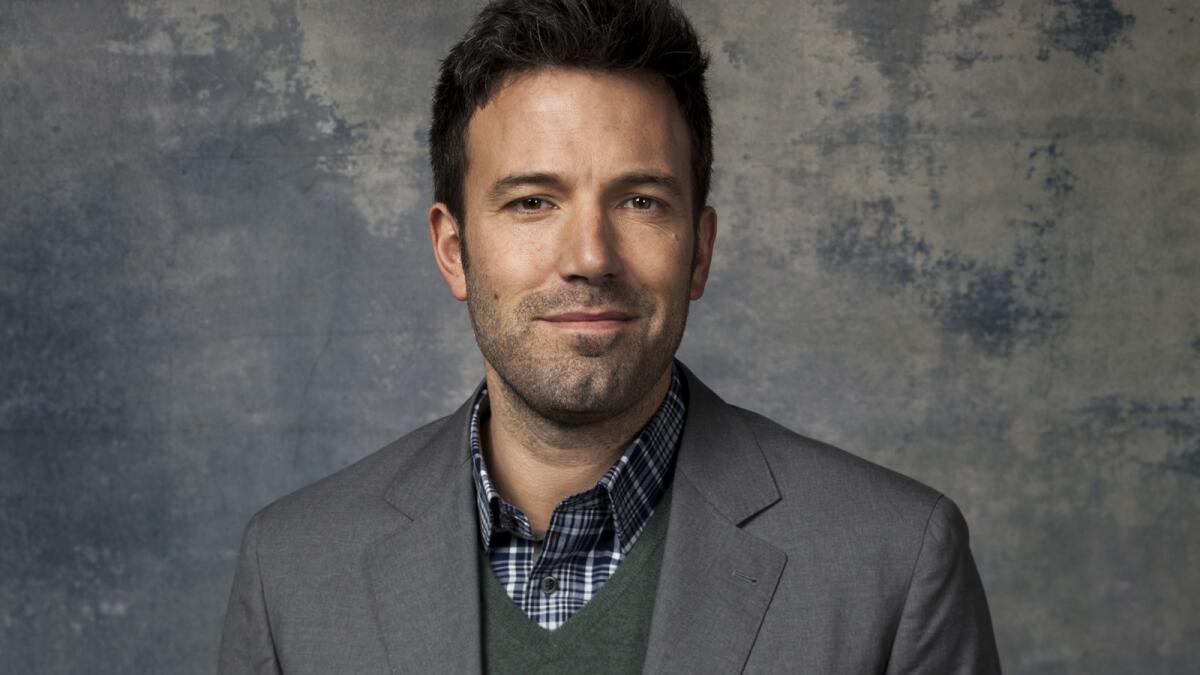On Ben Affleck slavery controversy, a slippery comparison

One of the more revealing details of Ben Affleck’s apology/defense of his decision to press PBS to edit out his slave-holding ancestor comes not when he’s detailing his embarrassment but when he makes an unexpected comparison: to shooting a film.
“I lobbied [the producer] the same way I lobby directors about what takes of mine I think they should use,” Affleck said in his explainer statement Tuesday. “This is the collaborative creative process. Skip [Gates, the show’s host] agreed with me on the slave owner but made other choices I disagreed with.”
Affleck of course has been facing heat over revelations, via a Wikileaks email dump, that he had PBS and Gates take out the material about his ancestor in an episode of “Finding Your Roots” last fall. The show aims to uncover the forebears of its famous participants. But when such an ancestor was found in Affleck’s lineage, he successfully persuaded producers (with some unsolicited help from Sony chief Michael Lynton) to remove that pesky fact.
The incident raises questions on the genealogical front (Anderson Cooper and Ken Burns turn out to have slave-owning roots as well) as well as the wisdom of Affleck’s whitewash effort. The actor would have been much better off leaving it in; he of course had nothing to do with his ancestor’s actions and a lot fewer people would have even paid attention (“I always tell the truth--it’s easier to remember,” as Twain had it).
But the movie comparison also jumped out. It’s meant as a kind of unimpeachable justification. “Yes, this seems like a self-serving erasure, but I was just following standard practice for any form of screen entertainment,” Affleck is basically saying.
It’s hardly that clear, though. Let’s leave aside the obvious distinctions. Viewers probably have a much higher expectation of truth in a PBS nonfiction show than in, say, a facial expression in “Batman v. Superman.” And you could argue that this isn’t much of a fair comparison--a film director knows Affleck and understands the protocol and whether he or she can push back. PBS, less regular dancers at the celebrity ball, might feel more cowed. (Gates noted in his exchange to Lynton that Affleck was “a megastar.”)
But let’s assume they’re identical situations. The tricky truth is that this kind of “lobbying” is not done as often as Affleck’s statement implies, nor is it done nearly as smoothly and without snags as his statement implies.
Plenty of actors do tell a director if they didn’t like a scene they shot, and a number of them will watch playback of the scene and make their feelings known more elaborately. But that hardly means the directors like such comments or will abide by them. On a set involving a well-known older actor and less-established younger director a few years ago, I watched as the actor kept pushing a director for more takes even though it was clear the director liked what he had shot. The director hid his frustration, barely. And you could tell he was going to just use the take he liked when he went to the edit room anyway. The idea that there is some kind of fruitful actor say in all but a handful of cases is misleading. Certainly it’s not common for an actor to dislike a take to the extent that a studio executive is discouraging its inclusion. And when a film production has gotten to that point, it’s usually a disaster.
In fact, the argument flies in the face of the tone actors themselves have set for years — that the best ones place a lot of “trust” in directors, that cinema is a director’s medium, that an actor willing to risk embarrassment for a creator’s larger vision is the optimal form of the craft. We reward an actor (justly) when he or she turns over control of their image to a role or director, as we do Matthew McConaughey in a “Dallas Buyers Club” or a Jennifer Aniston in a “Cake.” But now rejecting a take because it tells of something true but embarrassing is life as it should be?
Some have argued that Affleck did nothing wrong because he was a voluntary participant in “Finding Your Roots.” And indeed, an actor has no automatic obligation to tell us about his past. But Affleck did sign on for a TV show, just as he signs on to any movie. And that comes with an agreement to turn over a certain amount of control to the people behind the camera. When anxiety about your own image, and confidence in your own clout, motivates you to big-foot a producer, it reflects badly on you, no matter the medium.
More to Read
Only good movies
Get the Indie Focus newsletter, Mark Olsen's weekly guide to the world of cinema.
You may occasionally receive promotional content from the Los Angeles Times.







